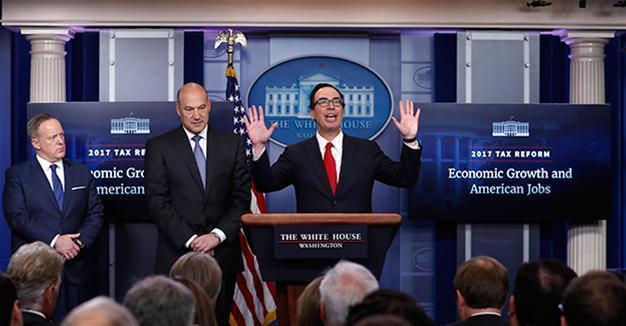Trump proposes major tax cuts, 15 pct corporate rate
WASHINGTON - Agence France-Presse

The Trump administration on April 26 unveiled plans to dramatically cut taxes for U.S. businesses and individuals, slashing the corporate rate to 15 percent, but the once-in-a-generation overhaul is headed for a tough fight in Congress.
As Donald Trump’s presidency nears the symbolic 100-day mark, the Republican is seeking to follow through on a flagship promise to reform the tax code to boost the economy, businesses and families, including middle-class and working-class Americans.
“Under the Trump plan, we will have a massive tax cut for businesses and massive tax reform and simplification,” US Treasury Secretary Steven Mnuchin announced from the White House.
Slashing taxes on income and business was a key part of Trump’s election platform.
The plan’s signature reform would be a dramatic reduction of the corporate tax rate, from the current 35 percent to 15 percent.
Tax brackets for individuals would be compressed from seven to just three -- 10 percent, 25 percent and 35 percent, lower than the current top rate of 39.6 percent.
“It’s a great plan,” Trump said at the White House on April 26. “It’s going to put people back to work.”
The proposal also eliminates the estate tax -- referred to by some opponents as the “death tax” -- a levy on property including cash and real estate transferred from deceased individuals to their heirs.
But with the tax plan limiting most deductions, it could expose more of an average American household’s income to taxes.
Gary Cohn, the president’s chief economic advisor who unveiled the plan along with Mnuchin, dubbed it “the most significant tax reform legislation since 1986, and one of the biggest tax cuts in American history.”
The goal, the White House said, is for the reforms to propel the US economy to three percent annual growth.
But the long-anticipated overhaul -- details of which remained unclear beyond a handful of headline measures -- could face stiff opposition in Congress, including from some Republicans, with lawmakers sharply divided over the prospect of fueling already-rising deficits.
“This isn’t going to be easy. Doing big things never is,” Cohn admitted.
“We will be attacked from the left and we will be attacked from the right. But one thing is certain: I would never ever bet against this president.”
Mnuchin declined to set a deadline for the reform passing Congress, but he said the administration was aiming to “get this done this year.”
He and Cohn said there was fundamental agreement on the core principles of the plan, although particulars were still being worked out with lawmakers.
A key element is a one-time tax on overseas profits, which Mnuchin said will “bring back trillions of dollars that are offshore to be invested here in the United States.”
That rate has yet to be finalized.
Also unclear is how current tax breaks for child care will be restructured.
The tax plan’s impact on the deficit and debt will be key to winning backing on Capitol Hill.
House Speaker Paul Ryan hailed the reform as “progress,” even though Mnuchin signalled it would not include a tax on imports, something Ryan lobbied for among fellow Republicans.
“It’s basically along exactly the same lines that we want to go,” Ryan said.
Warning to White House
Democrats sounded an immediate warning to the White House.
“If the president’s plan is to give a massive tax break to the very wealthy in this country, a plan that will mostly benefit people and businesses like President Trump’s, that won’t pass muster with we Democrats,” Senate Minority Leader Chuck Schumer said.
He also warned that a plan that dramatically shrinks tax revenues would “explode the deficit.”
“The only result of this plan will be a steep increase in our country’s deficit while leaving working- and middle-class families in the dust,” House Democrat Gwen Moore fumed in a statement.
Some Republicans, particularly in high-tax states, expressed concern about the proposed repeal of certain existing provisions.
“I can’t support it if it eliminates the property tax and state income tax deductions,” Congressman Peter King of New York told AFP.
 The Trump administration on April 26 unveiled plans to dramatically cut taxes for U.S. businesses and individuals, slashing the corporate rate to 15 percent, but the once-in-a-generation overhaul is headed for a tough fight in Congress.
The Trump administration on April 26 unveiled plans to dramatically cut taxes for U.S. businesses and individuals, slashing the corporate rate to 15 percent, but the once-in-a-generation overhaul is headed for a tough fight in Congress.